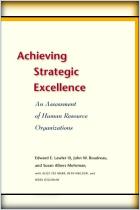Join getAbstract to access the summary!

Join getAbstract to access the summary!
Ralph Christensen
Roadmap to Strategic HR
Turning a Great Idea into a Business Reality
AMACOM, 2005
What's inside?
To transform your human resources department into a strategic business partner, you have to become a corporate leader.
Recommendation
Many people view the typical human resource department as an administrative heavy-hitter, home to experts in processing forms and muddling through paperwork. Employees who want to sign up for health benefits, contribute to a company’s 401K or ask a question about vacation or sick days make a beeline to HR. That has always been part of HR’s role. But the business landscape is changing rapidly. HR needs to reach beyond its traditional duties and become an integral part of an organization’s strategic planning. Author Ralph Christensen, a former corporate senior vice president, says it isn’t easy for an HR department to make the transition to becoming a strategic partner. But as painful as the process might be, it’s necessary for HR to move forward and evolve. Reading Christensen’s book won’t change things overnight, but getAbstract.com believes that if you want your company to stay ahead of the curve, this book deserves a prominent place on your shelf.
Summary
About the Author
Ralph Christensen, an international consultant, has been a senior vice president and a vice president at major American corporations.


















Comment on this summary